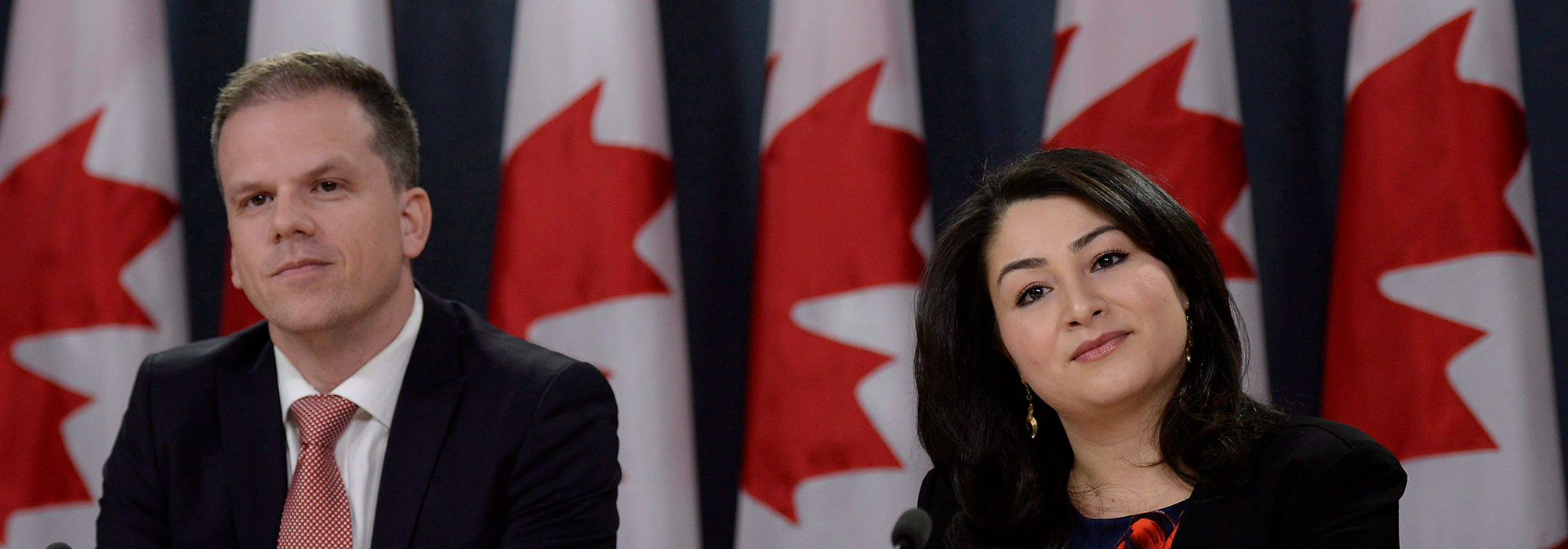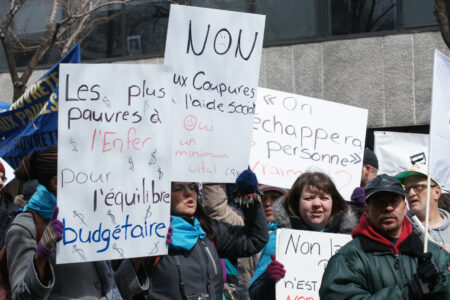
We should take our collective hat off to all the members of the House of Commons Special Committee on Electoral Reform, which worked in a spirit of civility and seemingly in good faith in less-than-ideal conditions created by the government (more on this below). Their majority report, which recommended the government design a new proportional voting system followed by a national referendum on it, was concurred in by committee members from no fewer than four parties – the Conservatives, the NDP, the Greens, and the Bloc Québécois. After four years of Harper-era-neutered committees, which were dominated by Conservative majorities voting as instructed by the Prime Minister’s Office, it would be edifying to see a different path, if possible.
However, proportional representation on a committee and good faith efforts do not guarantee unanimity, and we should not expect or want it to. And so it was that, disappointingly, the five Liberals on the committee did not join the four-party consensus.
Instead, the Liberals – including the chair – penned what they label as a “Supplementary Opinion,” which is clearly a dissenting opinion. The bottom line for the Liberals is that the government should do nothing more than create a new “comprehensive and effective citizen engagement” process, which the Liberals state flat-out “cannot be completed before 2019.” The 2019 date is obviously relevant, because the Liberals promised in their 2015 election platform — starkly and without exception — to replace the current FPTP system in time for the 2019 election.
I would like to think all five Liberal MPs just saw things very differently, and failed to be convinced by the vast majority of oral and written submissions that made clear that those Canadians engaged on this issue were strongly and cogently in favour of PR, while keen also to retain the link between MPs and their constituencies.
However, the structure of the Liberal dissent has enough tendentious elements that one really must ask the question whether at least some of those Liberals simply caved to the wishes of the Prime Minister’s Office (PMO), or whether they were under such pressure that they rationalized to themselves that the government’s own promise to get rid of the current voting system should be abandoned.
Here are just some samples of the strained arguments in the Liberal “supplementary” dissent.
1) They talk excitedly about racing in haste towards the “predetermined deadline” of 2019. This is the height of chutzpah when one considers that it was the Liberal government’s inexcusable delay that wasted eight months before the electoral reform committee was formed in late June 2016.
2) Perhaps most galling, they cite evidence that “Canadians are far from being adequately engaged with the electoral reform question.” This includes relying on polls that suggest low levels of awareness about the committee’s work. This is also the height of hypocrisy, as it was the Liberals’ delay strategy on the formation of the committee that forced the large bulk of its activity to occur in the summer, at a time when people generally tune out of politics (and even news generally).
They rub salt in by leaving unspoken how the electoral reform committee process was under-resourced and inadequately supported by the House’s Board of Internal Economy. The desire of committee members to produce visual models of electoral-system alternatives for use at the town halls (models that would likely have gone online and interested at least some media) was rebuffed. At one point, the committee was reduced to pleading with Minister of Democratic Institutions Maryam Monsef to use some of her considerable funds to support the educational side of the committee’s work, a true sign of desperation when one considers the Minister represents the executive, not the legislature.
3) The Liberal report actually misrepresents the majority report. The majority had recommended that the Gallagher Index be used to ensure proportionality. The Liberals characterized that recommendation as advocating that a new electoral system be “decided solely on the basis of a complex mathematical formula” [emphasis added]. This is completely untrue. The majority recommends the index as a way to test alternative system results in order to ensure that the distortion between votes received at the ballot box and seats in the House does not exceed a 5 percent deviation from what all parties would have received if the House seat allocation was 100 percent proportional. The Liberals go on to reproduce the Gallagher Index math equation in big, bold script — transparently intended to signal “complexity.” Expect this line and this image to be used often by the back-room Liberal machine.
4) The Liberals did exactly what I suspected they would do when they tabled Bill C-33 last week. That bill repeals some of the Conservatives Fair Elections Act (C-23), and adds in a welcome reform that would permit Elections Canada to preregister youth before they reach voting age. My fear was that Bill C-33 is partly designed to create a competing reform narrative, so that the Liberals can message C-33, come the 2019 election, as “electoral reform” – and do what we all know the Liberal Party is so good at, namely, confuse voters into thinking “X” when the truth is “Y.” The fact that the dissenting Liberal report spends time lauding C-33 on the young voters’ registration front is a clear sign that this is a strategy the Liberal back room has in mind.
5) The Liberal dissenters make much of “citizen engagement,” which is a virtual leitmotif of the current government. It could be these five Liberal MPs believe this is a real ethos of this government, but forgive me if I note that we have got to a point when the Prime Minister’s appeals to participation sometimes sound very hollow. Witness, earlier this week, how the massive, thoughtful, evidence-based input of citizens into the latest Kinder Morgan pipeline panel hearings were dismissed disdainfully by the PM when he lumped opposition to that pipeline into the basket of “political arguments,” claiming all the “science” was in his favour.
There are several other dimensions of the Liberal report one could detail, but my purpose here is to show that, one way or the other, all five Liberals on the electoral reform committee were focused on a result that will lead to zero electoral reform.
Many will have read up to this point and think that I am being overly speculative and negative and uncharitable to the Liberal political strategy. Here, let me remind readers that the Liberal decision not to take part in a multiparty, electoral-reform consensus occurs against a back-drop of not just a few, but many, pieces of evidence that the Liberals are aiming for a “noble failure” result (“we tried but, darn it, people just could not agree”) if they can get away with it.
Here is a list of just some of that evidence:
1) It started with the election platform when the top line promise was “We will make every vote count.” As I testified before the committee in early September, that promise is compatible only together with a commitment to proportional representation (PR). What I did not say, and what was apparent on the ground at the time of the election, was that the Liberals deliberately “borrowed” Fair Vote Canada’s slogan in order to fool as many people as possible into thinking the Liberals were not just open but favourable to PR. Any party capable of such a messaging tactic is capable of any number of other ways to achieve its goals. It would be naïve not to recognize this.
2) In June, the Prime Minister blamed the Conservatives for the delay in creating the committee, which led to him to having to apologize because the Conservatives had done nothing of the sort. Most just scratched their head at how the PM could have blurted out anything so inexplicably wrong. But, knowing the Liberal approach to things, it is not unlikely that the PM had been briefed that at some point the Liberal strategy would be to try to blame the Conservatives for obstruction — and the PM failed to note or recall he was not being told to make the accusation at that very moment.
3) This fall, we were treated to the Prime Minister giving an interview to Le Devoir in which he mused that people now did not seem all that interested in electoral reform. He then arrogantly overreached by adding that this was perhaps because of how happy they were with him and the Liberals. I rather suspect his briefers did not tell him to add that last bit. The outpouring of scorn — including in an unprecedented 20-part Twitter “essay” by Ed Broadbent — caused Trudeau to do a 180 the next day and pronounce himself fully committed to electoral reform. You can choose which Prime Minister to believe.
4) Minister Monsef had, until mid-fall, been a beacon of hope. She seemed committed to real reform, and in her appearance before the committee she identified precisely why the “archaic” FPTP had to be replaced. Of late, I fear that the PMO machine has been overpowering her own instincts and those of her Privy Council Office (PCO) advisers. Take the example of the committee (unanimously) asking to see the reports on her own 80 consultations across the country, in order to evaluate whether her general summary (along the lines of “Canadians are split”) was accurate. The Minister refused to do so. In a more adversarial parliament, this could easily have led to a motion ordering the Minister (rather than just a request), at pain of being found in contempt of Parliament. And take the example of the Minister waiting until this late stage to plan a mail-out to every Canadian household. asking them to go to a website to give their opinion on electoral reform, but (1) preparing the cards before even knowing ERRE’s recommendations, and (2) claiming this was a planned initiative when some quick research shows the websites were only registered as domains on — wait for it — October 24, scarcely a month ago.
5) Finally, there’s the matter of Liberal MPs talking out of school to reporters about their political calculations. After the committee’s report was tabled, the CBC reported that various Liberals felt they could break their electoral-reform promise and survive with limited harm to their brand.
Returning to the majority report, it will not be easy to make the deadlines. And a referendum could be gamed and undermined in order to retain FPTP — indeed this could be the calculation of the Conservative Party back room who are not on the same page as the valiant and principled MP Scott Reid who supports both a referendum and proportional representation.
But a combination of respect for the electoral promises and respect for the parliamentary process truly requires that the Trudeau government take the majority report and do its very best to implement it.
If, by a certain date, we have a “made in Canada” PR system designed and a referendum accepting that system, surely only the most churlish would condemn the government for not having it implemented by 2019.
But, if on this file the Liberals reinforce — as I have taken pains to demonstrate is their likely plan – their now well-deserved reputation for promise breaking, they should realize that Canadians’ generosity of spirit toward this government can reach a breaking point rather more easily than the back-room operation in the PMO assumes.
Photo: Minister of Democratic Institutions Maryam Monsef (right) and Parliamentary Secretary to the Minister of Democratic Institutions Mark Holland listen to a question during a press conference, on Thursday, Nov. 24, 2016 in Ottawa. Justin Tang / The Canadian Press
This article is part of the Electoral Reform special feature.
Do you have something to say about the article you just read? Be part of the Policy Options discussion, and send in your own submission. Here is a link on how to do it. | Souhaitez-vous réagir à cet article ? Joignez-vous aux débats d’Options politiques et soumettez-nous votre texte en suivant ces directives.






